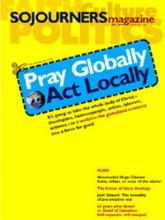Change Agents
How to Change the World: Social Entrepreneurs and the Power of New Ideas, by David Bornstein. Take a look at some social entrepreneurs—obsessive, mostly unknown folks who work quietly but move and shake with big ideas for creating social change. Stories of these indomitable activists securing electricity for rural Brazilians, improving care for AIDS patients in Pretoria, and pushing disability rights in India are inspiring—and replicable. Oxford University Press.
What Are You Hungry For?
"Food is a cultural, spiritual, and moral casserole," L. Shannon Jung says in Food for Life: The Spirituality and Ethics of Eating. We’ve never thought of it quite that way, but, then again, food isn’t just for our physical bodies. What can eating teach us about God, our relationships, and our hunger for a fulfilling purpose in life? A range of reflections to, um, chew on. Fortress Press.
B is for Buechner
Beyond Words: Daily Readings in the ABC’s of Faith, by Frederick Buechner. A favorite minister-writer offers witty definitions for words and biblical characters such as Eve, snobs, the Ethiopian eunuch—even "Buechner." In defining saints, he writes, "In his holy flirtation with the world, God occasionally drops a handkerchief. These handkerchiefs are called saints." Gomer, on the other hand, was "a little heavy with the lipstick," but "great at a party and always good for a laugh." HarperSanFrancisco.
The Mother Vice
Greed is the fourth slovenly transgression taken up by a little series of books from Oxford University Press on the seven deadly sins. But to author Phyllis A. Tickle, it’s the "matriarch of a deadly clan." Greed is an adventurous romp through our understanding of this particular evil and how it’s been interpreted in art, film, and literature. Whether it’s "avarice" or "covetousness" to you, Greed is fun reading for the literarily inclined.
Read the Full Article
